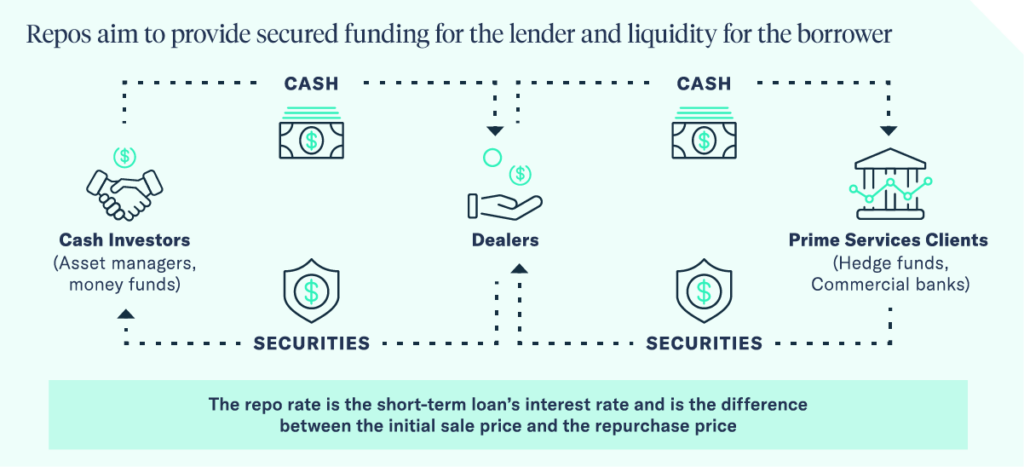There’s an old saying in the financial world: Liquidity is like oxygen you only notice it when it’s gone. And some of the most important – and least noticed – suppliers of that liquidity and therefore stability to the financial system are repurchase agreements, or repos.
Many investors may be unfamiliar with repos. While their name sounds clunky – it’s important not to confuse “repos” with repossessing a car or other items after failing to pay a loan. The significance of repos to the health of economic and business activity is immense.
Every day, numerous financial institutions, insurers, banks and other businesses utilize repos, borrowing more than $1 trillion cash for short term funding, often for overnight needs. They do this usually because they have a short term need for cash – for example, a bank that needs to meet its reserve requirements. Utilizing a repo therefore avoids the need to liquify longer term assets. As such, repos play a key role in keeping the economic machine running smoothly. With little fanfare, they are sort of the unsung work horses of the economy.
This article looks at what repos are, how they work, their benefits and connection to the Secured Overnight Financing Rate (SOFR), a key interest rate benchmark.
HOW REPOS WORK
Repurchase agreements are hardly a new technology, having been critical elements of the financial system for decades. A repo is simply a short-term agreement to sell securities and buy them back at a higher price, essentially functioning as a short-term, collateral-backed, interest-bearing loan. Although they can be complex, and they come in different shapes and sizes, it is important to understand the basics of how they work.
A business or an institution such as a bank or insurer has a short-term need for cash. The institution engages with a counterparty who agrees to sell securities to the institution, and then buy them back later at a slightly higher price, often the next day. The securities act as collateral, mitigating the risk for the lender. If the borrower cannot repurchase the securities for some reason, the lender has the right to sell them to recover the investment. In contrast to a typical loan, the difference between the sale price and the repurchase price functions as the interest on the loan.

SOFR SO GOOD
Repos may be little known outside of the financial world, but they are essential for a smoothly operating modern financial system. They provide a quick and efficient way for institutions to access cash and secure short-term funding without having to liquidate longer-term assets. They also help manage risks for the parties involved: Lenders are assured of repayment through the sale of securities if the borrower defaults, while borrowers benefit from lower interest rates due to the secured nature of the transaction.
But perhaps most importantly, at least for individual investors, is the key role they play in setting benchmark interest rates. The repo market helps determine the Secured Overnight Financing Rate (SOFR), a broad measure of the cost of borrowing cash overnight collateralized by Treasury securities. The New York Federal Reserve sets the rate daily, calculating it based on actual repo transactions which occurred the previous business day, and publishes it before the market opens.
SOFR is a relatively new development, only fully implemented in 2023, but it represents a major shift – and improvement – in the financial system. It replaced the London Interbank Offered Rate (LIBOR), which had existed for decades, but became tarnished in the early 2010s when it was discovered some banks had manipulated the rate to game certain trades. SOFR is calculated using a broader set of actual transactions than LIBOR and better represents what market participants are doing.
SUMMING UP
In short, although repos were developed for short-term funding needs for a range of institutions, they are extremely important for individual investors as well. As a benchmark interest rate, SOFR, determined by repo activity, affects everything from mortgage rates to money market yields. Indeed, repos have in fact long been used by portfolio managers, particularly in money market funds. It is important, therefore, to understand the vital role these unsung work horses play not just for the health of the financial system, but in individual investors’ portfolios.
Related ETFs:
SOF: Amplify Samsung Secured Overnight Financing Rate (SOFR) ETF
Past performance is no guarantee of future results.


